Kentlect
A strong academic record can open doors for you down the road. Here's a wise way to manage your time as a student and get Straight A's. Hassle-free experience for all up-to-date and recent study materials. Don't hesitate to leave a review .
- 116
- 0
- 0
Community
- Followers
- Following
2 Reviews received
116 items
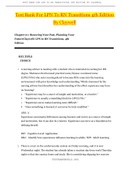
Test Bank For LPN To RN Transitions
Test Bank For LPN To RN Transitions 4th Edition By Claywell Chapter 01: Honoring Your Past, Planning Your Future Claywell: LPN to RN Transitions, 4th Edition MULTIPLE CHOICE 1. A nursing advisor is meeting with a student who is interested in earning her RN degree. She knows that licensed practical nurse/license vocational nurse (LPN/LVNs) who enter nursing school to become RNs come into the learning environment with prior knowledge and understanding. Which statement by the nursing ad...
- Book
- Exam (elaborations)
- • 269 pages •
Test Bank For LPN To RN Transitions 4th Edition By Claywell Chapter 01: Honoring Your Past, Planning Your Future Claywell: LPN to RN Transitions, 4th Edition MULTIPLE CHOICE 1. A nursing advisor is meeting with a student who is interested in earning her RN degree. She knows that licensed practical nurse/license vocational nurse (LPN/LVNs) who enter nursing school to become RNs come into the learning environment with prior knowledge and understanding. Which statement by the nursing ad...
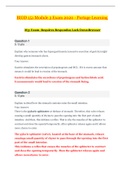
BIOD 151 Module 3 Exam
BIOD 151 Module 3 Exam 2020 - Portage Learning M3: Exam- Requires Respondus Lock Down Browser Explain why someone who has hypergastrinemia (excessive secretion of gastrin) might develop gastric/stomach ulcers. Your Answer: Gastrin stimulates the secretaion of pepsinogenes and HCL. If it is excess amounr that means it would be lead to erosion of the stomach. Gastrin stimulates the secretions of pepsinogens and hydrochloric acid. Excess amounts would lead to erosion of the stomach linin...
- Exam (elaborations)
- • 28 pages •
BIOD 151 Module 3 Exam 2020 - Portage Learning M3: Exam- Requires Respondus Lock Down Browser Explain why someone who has hypergastrinemia (excessive secretion of gastrin) might develop gastric/stomach ulcers. Your Answer: Gastrin stimulates the secretaion of pepsinogenes and HCL. If it is excess amounr that means it would be lead to erosion of the stomach. Gastrin stimulates the secretions of pepsinogens and hydrochloric acid. Excess amounts would lead to erosion of the stomach linin...
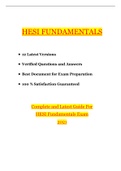
Complete and Latest HESI Fundamentals Exam
HESI FUNDAMENTALS • 12 Latest Versions • Verified Questions and Answers • Best Document for Exam Preparation • 100 % Satisfaction Guaranteed Complete and Latest Guide For HESI Fundamentals Exam 2021 HESI FUNDAMENTALS 1. A policy requiring the removal of acrylic nails by all nursing personnel was implemented 6 months ago. Which assessment measure best determines if the intended outcome of the policy is being achieved. a. Number of staff induced injury b. Clie...
- Exam (elaborations)
- • 457 pages •
HESI FUNDAMENTALS • 12 Latest Versions • Verified Questions and Answers • Best Document for Exam Preparation • 100 % Satisfaction Guaranteed Complete and Latest Guide For HESI Fundamentals Exam 2021 HESI FUNDAMENTALS 1. A policy requiring the removal of acrylic nails by all nursing personnel was implemented 6 months ago. Which assessment measure best determines if the intended outcome of the policy is being achieved. a. Number of staff induced injury b. Clie...

Essentials of Pathophysiology 4th Edition by Porth
1. The nucleus , which is essential for function and survival of the cell. A) is the site of protein synthesis B) contains the genetic code C) transforms cellular energy D) initiates aerobic metabolism 2. Although energy is not made in mitochondria, they are known as the power plants of the cell because they: A) contain RNA for protein synthesis. B) utilize glycolysis for oxidative energy. C) extract energy from organic compounds. D) store calcium bonds for muscle cont...
- Exam (elaborations)
- • 512 pages •
1. The nucleus , which is essential for function and survival of the cell. A) is the site of protein synthesis B) contains the genetic code C) transforms cellular energy D) initiates aerobic metabolism 2. Although energy is not made in mitochondria, they are known as the power plants of the cell because they: A) contain RNA for protein synthesis. B) utilize glycolysis for oxidative energy. C) extract energy from organic compounds. D) store calcium bonds for muscle cont...
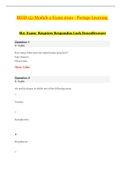
BIOD 151 Module 2 Exam
BIOD 151 Module 2 Exam 2020 - Portage Learning M2: Exam- Requires Respondus Lock Down Browser How many lobes does the right human lung have? Your Answer: Three lobes. Three Lobes Air and food pass in which one of the following areas: Trachea Nasopharynx Oropharynx Alveoli Rings of cartilage line much of the respiratory tract. In which of one the following would cartilage NOT be found? Trachea Larynx Bronchi Alveoli Label the fo...
- Exam (elaborations)
- • 25 pages •
BIOD 151 Module 2 Exam 2020 - Portage Learning M2: Exam- Requires Respondus Lock Down Browser How many lobes does the right human lung have? Your Answer: Three lobes. Three Lobes Air and food pass in which one of the following areas: Trachea Nasopharynx Oropharynx Alveoli Rings of cartilage line much of the respiratory tract. In which of one the following would cartilage NOT be found? Trachea Larynx Bronchi Alveoli Label the fo...
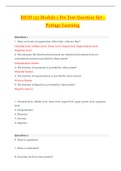
BIOD 151 Module 1
BIOD 151 Module 1 Pre Test Question Set - Portage Learning Question 1 1. There six levels of organization of the body- what are they? Chemical level, Cellular Level, Tissue Level, Organ Level, Organ System Level, Organism Level 2. The necessary life function that protects our internal environment from our external environment is provided by what system? Integumentary System 3. The function of movement is provided by what system? Muscular System 4. The function of responsiveness is prov...
- Exam (elaborations)
- • 20 pages •
BIOD 151 Module 1 Pre Test Question Set - Portage Learning Question 1 1. There six levels of organization of the body- what are they? Chemical level, Cellular Level, Tissue Level, Organ Level, Organ System Level, Organism Level 2. The necessary life function that protects our internal environment from our external environment is provided by what system? Integumentary System 3. The function of movement is provided by what system? Muscular System 4. The function of responsiveness is prov...
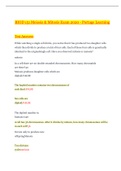
BIOD 151 Meiosis & Mitosis Exam
BIOD 151 Meiosis & Mitosis Exam 2020 - Portage Learning Test Answers While watching a single cell divide, you notice that it has produced two daughter cells which then divide to produce a total of four cells. Each of those four cells is genetically identical to the original single cell. Have you observed mitosis or meiosis? mitosis In a cell there are 20 double stranded chromosomes. How many chromatids are there? 40 Meiosis produces daughter cells which are diploid. FALSE The haploid n...
- Exam (elaborations)
- • 7 pages •
BIOD 151 Meiosis & Mitosis Exam 2020 - Portage Learning Test Answers While watching a single cell divide, you notice that it has produced two daughter cells which then divide to produce a total of four cells. Each of those four cells is genetically identical to the original single cell. Have you observed mitosis or meiosis? mitosis In a cell there are 20 double stranded chromosomes. How many chromatids are there? 40 Meiosis produces daughter cells which are diploid. FALSE The haploid n...
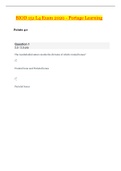
L4 Exam (BIOD 151 )
BIOD 151 L4 Exam 2020 - Portage Learning Points 40 The Lambdoidal suture marks the division of which cranial bones? Frontal bone and Parietal bones Parietal bones Occipital bone and Parietal bones Temporal bone and Parietal bones Which endocrine gland is situated in the cranial bone pictured above (highlighted in blue)? Your Answer: Pituitary gland The pituitary gland is situated in the hypophyseal fossa of the sphenoid bone. Which facial bo...
- Exam (elaborations)
- • 13 pages •
BIOD 151 L4 Exam 2020 - Portage Learning Points 40 The Lambdoidal suture marks the division of which cranial bones? Frontal bone and Parietal bones Parietal bones Occipital bone and Parietal bones Temporal bone and Parietal bones Which endocrine gland is situated in the cranial bone pictured above (highlighted in blue)? Your Answer: Pituitary gland The pituitary gland is situated in the hypophyseal fossa of the sphenoid bone. Which facial bo...
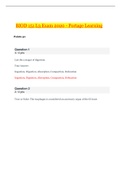
L3 Exam (BIOD 151)
BIOD 151 L3 Exam 2020 - Portage Learning Points 40 List the 5 stages of digestion. Your Answer: Ingestion, Digestion, Absorption, Compaction, Defecation Ingestion, Digestion, Absorption, Compaction, Defecation True or False: The esophagus is considered an accessory organ of the GI tract. True False True or False: The tongue is considered an accessory organ of the GI tract. True False True or False: Chemical digestion in the mouth is carried o...
- Exam (elaborations)
- • 14 pages •
BIOD 151 L3 Exam 2020 - Portage Learning Points 40 List the 5 stages of digestion. Your Answer: Ingestion, Digestion, Absorption, Compaction, Defecation Ingestion, Digestion, Absorption, Compaction, Defecation True or False: The esophagus is considered an accessory organ of the GI tract. True False True or False: The tongue is considered an accessory organ of the GI tract. True False True or False: Chemical digestion in the mouth is carried o...
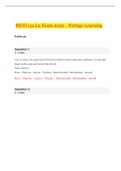
L2 Exam (BIOD 151)
BIOD 151 L2 Exam 2020 - Portage Learning Points 40 List, in order, the anatomical structures found in the respiratory pathway. You should begin at the nose and end at the alveoli. Your Answer: Nose - Pharynx - Larynx - Trachea - Main bronchi - Bronchioles - Alveoli Nose – Pharynx – Larynx – Trachea – Main bronchi – Bronchioles – Alveoli Which of the following statements is TRUE regarding structures within the respiratory tract? a. The trachea contains cartilag...
- Exam (elaborations)
- • 12 pages •
BIOD 151 L2 Exam 2020 - Portage Learning Points 40 List, in order, the anatomical structures found in the respiratory pathway. You should begin at the nose and end at the alveoli. Your Answer: Nose - Pharynx - Larynx - Trachea - Main bronchi - Bronchioles - Alveoli Nose – Pharynx – Larynx – Trachea – Main bronchi – Bronchioles – Alveoli Which of the following statements is TRUE regarding structures within the respiratory tract? a. The trachea contains cartilag...

Introduction to Human Anatomy and Physiology 4th Edition BY Solomon Test Bank
Zumdahl Chemistry 9th Edition Test Bank